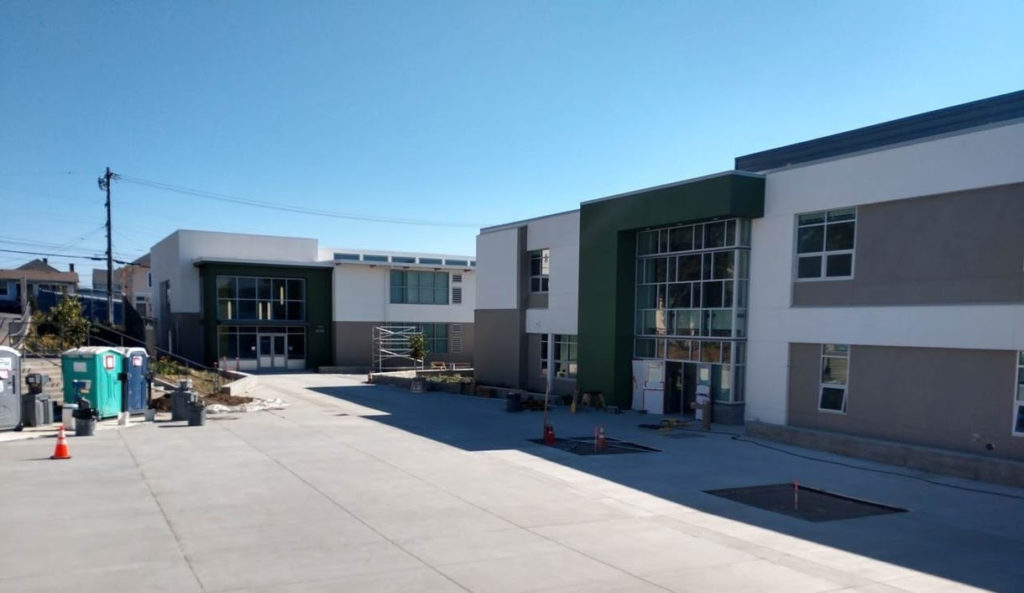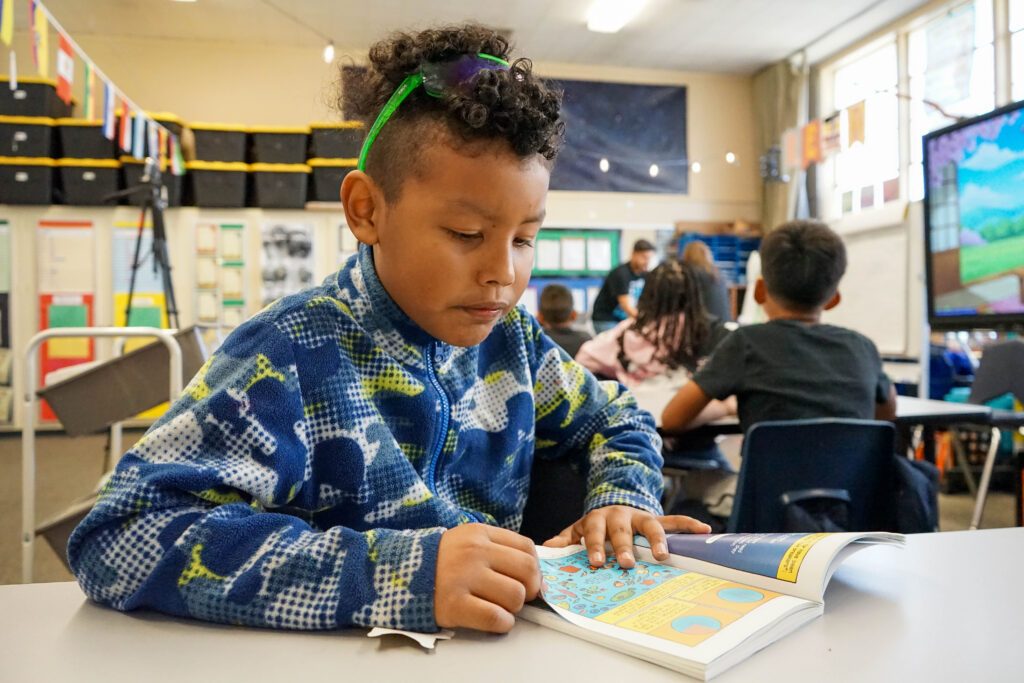
A Fresno Unified student reads a book during class.
Credit: Fresno Unified / Flickr
TOP Takeaways
The sponsors and opponents of a comprehensive, statewide approach to teaching early literacy are no closer to a deal than a year ago.
The latest bill would require the State Board of Education to designate courses in research-based methods of teaching reading, also known as the science of reading, and for all K-5 teachers to take them. The board would approve textbooks and materials for teachers to use.
The ongoing feud pits the bill’s sponsors — the NAACP, Coding Dyslexia CA, EdVoice and Families in Schools — against the California Teachers Association, Californians Together, and the California Association of Bilingual Education.
Phonics instruction is again at the center of the debate. Opponents say an excessive amount would harm English learners; supporters say the bill is clear: Decoding is essential for all students, but so are other elements of reading.
Last April, Assembly Speaker Robert Rivas pulled a bill on early literacy instruction and asked proponents and adversaries to reach a compromise on legislation for improving the reading skills of California students, which overall are dismal.
That hasn’t happened. After several broad discussions yielding little, the three main opponents — the California Teachers Association, the California Association for Bilingual Education (CABE), and Californians Together — released statements within the past month opposing the latest version of the legislation.
Both sides say they are willing to keep talking. However, the April 30 deadline for an initial hearing of bills is fast approaching, and with it, the rising level of frustration of the revised bill’s author, Assemblymember Blanca Rubio, D-Baldwin Park.
“The kids don’t have unions. They only have us. We can’t keep kicking the can down the road. Our kids are not achieving, and not doing anything different is not working,” Rubio said. “We have a great opportunity right now so we don’t keep falling behind.”
Like its 2024 version, Rubio’s Assembly Bill 1121 would require state-funded training of all K-5 teachers in reading instruction grounded in decades of evidence-based studies and brain research known as the science of reading. The bill would require the State Board of Education to approve a choice of textbooks and materials aligned to those practices.
The advocacy groups sponsoring AB 1121 — Decoding Dyslexia CA, EdVoice, Families In Schools, and the California NAACP — insist that failure to approve the bill would stall the piecemeal progress by the Newsom administration and the Legislature. It would leave big holes vital to establish a coherent statewide system of teaching reading.
“Teachers are doing their best with what they know and can’t figure out why their kids are not reading at grade level,” said Yolie Flores, president and CEO of Families in Schools, a Los Angeles-based nonprofit that advocates for parents.
The state’s approach of creating academic frameworks and letting districts implement them as they want is harming children, she said. “Guidance isn’t cutting it. This bill is about taking it to the next level and making sure that teachers get this training and have the right materials.”
Wide disparities in proficiency
On the 2024 National Assessment of Educational Progress, the 41 percentage point gap in proficiency between economically and non-economically disadvantaged students was among the widest in the nation — and growing. Only 8% of Black and 23% of Hispanic fourth graders in California were proficient in reading, compared with 56% of white and 67% of Asian students.
On the 2024 results from California’s standardized tests, only 43% of all students were proficient in English language arts in third grade, a critical predictor of future academic success; a third of low-income students were proficient, compared with 63% of non-low income students. Of the third-grade English learners taking the initial English Language Proficiency Assessments for California, 14% were proficient.
The opposing groups say they share concern over low test scores but that AB 1121 is not the solution. Their disagreement appears deep-seated and perhaps unbridgeable.
The opponents are centering their criticism on phonics, a contentious issue for 40 years. They assert the bill overemphasizes decoding skills of phonics and phonemic awareness at the expense of developing other foundational skills needed by all children, but especially English learners: oral fluency, vocabulary, background knowledge, and comprehension. Phonics refers to explicit instruction on how to connect letters to sounds. Phonemic awareness refers to the ability to recognize elements of sound.
Rubio and the bill’s supporters say the opponents are mischaracterizing the intent of the bill and what it actually says.
“I don’t know anyone who advocates for just a phonics-based approach. That would be ridiculous,” said Leslie Zoroya, reading project director for the Los Angeles County of Education. “Why would you teach them just to decode and not work on vocabulary and background knowledge and fluency and all the other pieces that are included?”
With a $5 million state grant, more than 8,000 teachers have taken “Getting Reading Right,” a short course on the principles of the science of reading offered by Zoroya’s office; they include all K-2 teachers in Long Beach, the state’s fourth-largest district.
“It’s not either-or. We do decoding work, vocabulary work, oral language, knowledge building, the whole kit and caboodle,” Zoroya said. “There’s been more of a heavier emphasis on phonics over the last couple of years in California because our teachers don’t understand it. They weren’t taught it in their teacher ed programs. I got a reading certificate from USC, and I didn’t get it.”
David Goldberg, president of the California Teachers Association union, stated that the union opposed the bill in its current form because “it negatively impacts locally made decisions to set priorities that meet the instructional needs of their students.”
Adding an unlikely precondition for supporting the bill, Goldberg insists that “any comprehensive, statewide approach to literacy must include fully funded and staffed schools with qualified educators and staff.”
Californians Together, an organization that advocates for the spread of bilingual education as well as the needs of English learners — who make up a fifth of California’s students — wrote in its three-page opposition letter that “without a clear emphasis on meeting the needs of multilingual learners, the bill’s professional development requirement is inadequate and misaligned with the needs of California’s diverse student population.”
The letter also criticizes the bill for taking “an overly narrow approach that prioritizes foundational reading skills at the expense of other critical components of literacy.”
An authority in English learner education who disagrees is Claude Goldenberg, a Professor of Education, emeritus, at Stanford University, who said that passage of the bill would be “an important, even if modest, step forward.”
“The fact is that the research that applies to kids who know English already applies to kids who are learning English, it’s just that they also need English language development,” he wrote.
State policy’s shift toward the science of reading
Under Newsom, the state has implemented pieces of a coherent, evidence-based system of reading instruction that shifts from a “balanced” and “whole” language approach to reading instruction. Balanced language downplays phonics in favor of teaching words through looking at pictures and guessing based on a word’s context in a paragraph.
- Starting next fall, the state will require kindergarten through second grade teachers to test students for potential reading challenges like dyslexia with a multi-language screening tool.
- The Legislature passed a law that requires teacher credentialing programs to teach science of reading instruction.
- Using one-time money, Newsom appropriated $500 million to train reading coaches in lowest-income schools in the science of reading.
- The Department of Education is creating guides and instruction modules for a “literacy road map.” It emphasizes “explicit instruction in phonics, phonemic awareness, and other decoding skills” in the early grades.
While the new guidance is helpful, Zoroya said, “we have not put the same amount of effort into wide-scale professional learning for teachers. And that’s a disservice to them.”
‘It only makes sense, Rubio and allies argue, to take the next step and universally provide the same evidence-based instruction to all elementary school teachers and textbooks that support it. Otherwise, newly trained teachers face the confusing prospect of working in a “balanced language” district where instruction will contradict what they just learned.
Rubio and the sponsors had assumed they answered opponents’ main concerns in writing AB 1121. They deleted the previous bill’s numerous references to the “science of reading,” a source of contention. Instead, they tied the bill’s wording to the existing, but unenforced, requirements for evidence-based reading instruction in the state’s English Language Arts and English Language Development instructional frameworks and in the California Education Code.
Their opposition letters showed that the opponents were not at all mollified.
The sponsors said they have repeatedly asked CABE, Californians Together and CTA for further changes to AB 1121 but haven’t received any.
“The author has been clear; the sponsors are clear. We are very open to improving the bill if there are improvements,” said Marshall Tuck, CEO of EdVoice, who has participated in the discussions with opponents.
In an email responding to questions about her group’s opposition to the bill, Martha Hernandez, executive director of Californians Together, wrote, “We understand that amendments to AB 1121 may be forthcoming, and we remain committed to engaging in the process with a focus on ensuring that any policy advances equitable access to effective, research-based literacy instruction for English learners.”
‘Rubio was blunt. “I can’t guess what they’re thinking. That’s the whole point of a negotiation. They have to bring something to the table. I can’t negotiate against myself.”
Rubio said she expects the bill to get a hearing before April 30 and will ask Speaker Rivas for a way forward, regardless of the continued opposition.
Meanwhile, Assembly Education Chair Al Muratsuchi, D-Torrance, is discussing a compromise with individuals he wouldn’t name through a separate bill he is authoring. It would create incentives but not require school administrators to take similar early literacy training that teachers would receive under AB 1121. But, like CTA, he said he favors “local control of allowing local school districts to determine what works best for their kids.”
Rivas was noncommittal. Stating he was tracking negotiations, a statement from his office said, “The Speaker looks forward to legislation that reflects greater consensus on this issue, and one that supports all students, including multilingual learners.”





